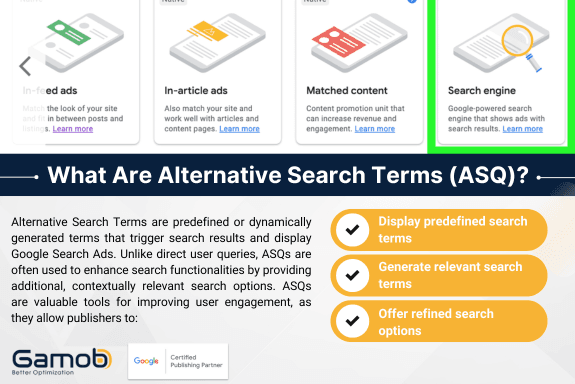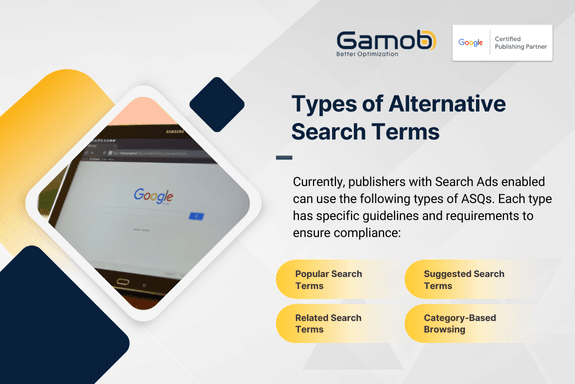Publisher Resources
Google Search Ads Policy: Alternative Search Terms Explained
Tracy Nguyen
December 11, 2024

Subscribe to receive the latest blog posts to your inbox every week.
By subscribing you agree to with our Privacy Policy.
In the world of online advertising, Alternative Search Terms (ASQ) provide a unique and innovative way for publishers to enhance search functionalities and monetize their platforms through Google Search Ads (CSA). Unlike traditional user-entered search terms, ASQs are terms that trigger search results (Search Engine Results Pages, or SERPs) without being directly input by users into a search box. This approach offers publishers flexibility while maintaining relevance for users and advertisers.
However, using Alternative Search Terms comes with strict guidelines. These policies govern how ASQs are implemented, formatted, and displayed, ensuring compliance with Google's content standards and user experience expectations. In this blog, we’ll dive into the details of Google’s Search Ads Policy for Alternative Search Terms, the types of ASQs available, and how to implement them effectively while staying compliant.
What Are Alternative Search Terms (ASQ)?
Alternative Search Terms are predefined or dynamically generated terms that trigger search results and display Google Search Ads. Unlike direct user queries, ASQs are often used to enhance search functionalities by providing additional, contextually relevant search options. ASQs are valuable tools for improving user engagement, as they allow publishers to:
Display predefined search terms based on popular queries.
Generate relevant search terms dynamically based on user interactions.
Offer refined search options through category-based navigation.
These terms are essential for creating a more seamless user experience while maximizing advertising revenue. However, they must adhere to Google’s Search Ads Policy, which outlines clear requirements for their implementation, content, and behavior.

General Requirements for Alternative Search Terms
Using ASQs on websites or apps that display Google Search Ads requires strict adherence to the following guidelines:

Content Compliance
ASQs must not contain keywords or content that violates Google’s Content Policies, legal regulations, or third-party rights.
Publishers must ensure that ASQs align with Google’s AdSense Program Policies, avoiding any content that is misleading or inappropriate.
Keyword Relevance
Keywords in ASQs must closely match the content users are engaging with. For example, if a user clicks on “flower bouquet,” the resulting search query should trigger ads for “flower bouquet,” not generic terms like “flowers” or unrelated terms like “gift delivery.”
Transparency
Publishers must ensure that every click on an ASQ is made by an end user and leads to a SERP. This is essential for maintaining the integrity of user interactions and ensuring eligibility for displaying search ads.
Design for Relevance
ASQs should suggest the most relevant search terms, not be artificially designed to generate high-cost-per-click ads or inflate impressions, clicks, or conversions unnaturally.
Google Approval
In some cases, Google may request modifications to or removal of specific ASQs or keywords from the advertising request.
By adhering to these general requirements, publishers can use ASQs to enhance search experiences while maintaining compliance with Google’s advertising policies.
Types of Alternative Search Terms
Currently, publishers with Search Ads enabled can use the following types of ASQs. Each type has specific guidelines and requirements to ensure compliance:
1. Popular Search Terms
Definition:
Popular search terms are ASQs generated from the most frequently searched keywords on your site. When users click on these terms, they are directed to a SERP that includes relevant Google Search Ads.
Additional Requirements:
Popular ASQs must originate from the most common search terms entered by users on your platform.
Publishers must update the list of popular ASQs at least once a week to ensure relevance and accuracy.
ASQs of this type must be clearly labeled as “Popular Search Content” or similar, as approved by Google.
Popular search terms are ideal for highlighting trending topics or frequently searched content, helping users find what they’re looking for more efficiently.
2. Suggested Search Terms
Definition:
Suggested search terms are dynamically displayed ASQs that appear as users type into the search box. These terms refine and predict what users might be searching for, leading to a SERP once selected.
Additional Requirements:
Suggested ASQs must directly relate to the content users enter into the search box. For example, if a user types “flo,” the suggestion might be “flower bouquet.”
Suggested ASQs must be labeled clearly as suggestions and must not imply direct affiliation with Google.
The display and behavior of suggested ASQs must match Google-approved simulations unless explicit approval for custom designs is obtained.
By using suggested search terms, publishers can improve user experience by reducing search effort and guiding users to relevant results quickly.
3. Related Search Terms
Definition:
Related search terms are ASQs generated based on previous user queries. They offer additional options that expand on the user’s original search, allowing for deeper exploration of a topic or category.
Additional Requirements:
Related ASQs must be labeled as “Related Search Terms” or similar, as approved by Google.
Only two ad units containing related ASQs are allowed per page.
Placement options for related ASQs include:
To the left or right of search results.
Below search results.
Between the top ad unit and search results.
Related ASQs provide a natural way to encourage further engagement by offering users relevant follow-up searches.
4. Category-Based Browsing
Definition:
Category-based browsing allows users to refine their searches by navigating through predefined menus or directories. For example, a user on an e-commerce site might browse categories like “Men’s Clothing” > “Shirts” > “Formal Shirts,” narrowing results step-by-step.
Additional Requirements:
Ads can only be displayed in response to clicks on sufficiently specific ASQs. For instance, a click on “Sweaters” may trigger ads, but a general click on “Clothing” may not.
Category-based ASQs must demonstrate sufficient depth and breadth of content to qualify for search ads.
Primary categories can be included in ad requests but must clearly relate to the user’s navigation path.
Category-based browsing is particularly effective for e-commerce and content-heavy platforms, where users benefit from structured navigation.
Best Practices for Implementing ASQs
To maximize the benefits of Alternative Search Terms while staying compliant with Google’s policies, consider these best practices:
Keep Content Fresh
Regularly update ASQs to reflect the latest trends, popular searches, and user behavior. This ensures relevance and improves engagement.Ensure Accurate Labeling
Use clear, descriptive labels for all ASQs, such as “Popular Searches” or “Related Searches,” to avoid user confusion.Maintain Relevance
Always ensure that ASQs align closely with user intent and the content on your site. Irrelevant or misleading ASQs can harm user experience and violate Google’s policies.Test Placement Options
Experiment with different ASQ placements (e.g., sidebars, below results) to find the most effective configuration for your audience.Avoid Overloading Pages
Limit the number of ASQ ad units on each page to maintain a clean, user-friendly layout.
Alternative Search Terms (ASQs) are a powerful tool for publishers looking to enhance their search functionalities and boost ad revenue through Google Search Ads. By offering predefined or dynamically generated search terms, ASQs improve user engagement while providing advertisers with highly relevant audiences.
However, compliance with Google’s Search Ads Policy is essential. From maintaining keyword relevance to adhering to content guidelines, publishers must follow these rules to ensure a positive user experience and maintain their standing with Google. By implementing ASQs thoughtfully and strategically, you can unlock their full potential while staying compliant and driving meaningful results.
[Source: Google]
---------------------
Gamob | GCPP - Empower your monetization journey
Email: [email protected]
Website: www.gamob.com
Linkedin: www.linkedin.com/company/gamob-gcpp